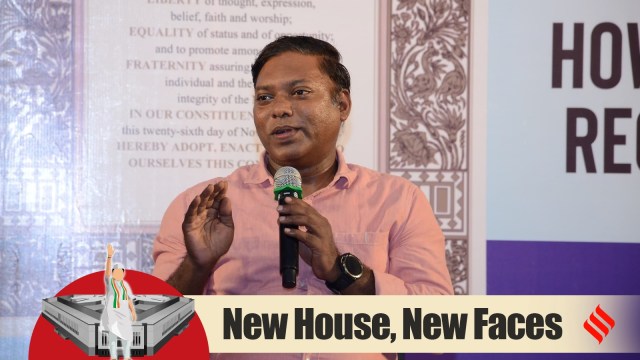Sasikanth Senthil’s long road from Tiruvallur, and from stories of untouchability and why Constitution matters
The Tamil Nadu Congress MP is an NIT graduate who quit private sector job to join the civil services and then moved to politics, driven by the need to “do something for the people” and “counter BJP’s Hindutva agenda”
 Sasikanth Senthil began to imbibe social consciousness at a young age, he says, when in 2002 the BJP-ruled Gujarat witnessed riots that killed hundreds. (Photo: Sasikanth Senthil/ Facebook)
Sasikanth Senthil began to imbibe social consciousness at a young age, he says, when in 2002 the BJP-ruled Gujarat witnessed riots that killed hundreds. (Photo: Sasikanth Senthil/ Facebook)Sasikanth Senthil, a first-time Congress MP from Tamil Nadu’s Tiruvallur, grew up listening to stories of untouchability in Mathur, his father P Shanmugam’s home town. Senthil was also taught the values of the Constitution, facets of which had bettered his father’s life and that of his own, he says.
“My father, who had faced the brunt of casteism, grew up on benefits for Dalits enshrined in the Constitution. He studied in government schools and colleges, stayed in government hostels and homes, and studied to become a judicial officer,” Senthil told The Indian Express.
So, when the BJP government abrogated Article 370 of the Constitution and erased the statehood of Jammu and Kashmir in 2019, Senthil resigned from his role as the deputy commissioner of the Dakshina Kannada district in Karnataka and took a plunge into social service. Five years later, he contested on a Congress ticket from Tiruvallur and won by a margin of 5.72 lakh votes against V Balaganapathy of the BJP.
There was, however, a distinctly informed journey behind his entry into politics, he says.
“My father used to say that one of his sons should work towards betterment of the society and the other should work towards betterment of our household. I am the one for society and my younger brother is the one for our home,” Senthil said.
At Senthil’s home in Chennai – the city to which his father moved to get an education and later a job – conversations revolved around caste discrimination that his family had faced in their native village. “This gave me an understanding of how society works,” he said.
He began to imbibe social consciousness at a young age, he says, when in 2002 the BJP-ruled Gujarat witnessed riots that killed hundreds. “I was in my 20s and had started observing the politics in Gujarat and knew that the BJP’s agenda should be countered. But I had not figured out how,” he said.
Senthil went on to study at the National Institute of Technology, Tiruchirapalli, and found a lucrative career in a private software company. Something was, however, amiss. “I still wanted to serve the people. So, I quit my job and taught in a private college for a year,” Senthil said. He says he discovered himself during this time and decided to apply for the civil service examination because he wanted to be a public servant. Senthil cleared the UPSC, bagging all-India ninth rank and became a Karnataka-cadre IAS officer in 2009.
His journey was not yet complete, he said, as he kept feeling “uncomfortable with the BJP’s Hindutva politics” after the party came to power in 2014. He said he was “shocked” when the BJP returned to form the government in 2019, with an overwhelming majority. “During this time people in high offices were mostly silent. But when I resigned from my job, I knew that I was already on my way to opposing the BJP,” Senthil said.
While his politics after his resignation revolved around creating awareness about the Citizenship (Amendment) Act (CAA) and National Register of Citizens (NRC), he says the 2020 Delhi riots were another turning point. “I realised that the BJP should be countered politically. I went to the Congress office and joined the party,” he said.
Over the next four years he worked for the Congress in various states during their Assembly elections – Tamil Nadu, Karnataka, Rajasthan and Telangana. Even for the 2024 Lok Sabha elections, Senthil was a part of the Congress war room.
Initially after joining the Congress, Senthil worked with the party’s training vertical. In the 2021 Tamil Nadu Assembly elections, he worked at the party’s war room in Chennai. As the party was impressed by his work, he was entrusted with the task of liaising between Rahul Gandhi and civil society members during the three-week Karnataka leg of his Bharat Joda Yatra in September-October 2022.
For the 2023 Karnataka Assembly polls, Senthil headed the Congress’s war room and played a key role in formulating the narrative against the former Basavaraj Bommai-led BJP government. Senthil helped conceive a series of anti-corruption campaigns targeting the BJP, especially centred around its “40% commission government” plank. The most innovative of these was the “PayCM” campaign, with posters featuring a QR code and a photograph of CM Bommai titled “PayCM” springing up across Bengaluru.
During the recent Lok Sabha elections, since he was working for other candidates, he only had 19 days to campaign in his own constituency of Tiruvallur. “During those 19 days, I went and met as many people as possible. I was happy to get love and affection from my constituency,” Senthil said.
Senthil hopes to use the Lok Sabha platform now to speak for his people and in the interest of the country. After taking oath in Parliament, he said, “Stop the shameful atrocities against Dalits, Adivasis and minorities.”
The Congress MP said what he spoke of that day was only the beginning. He hopes to balance out the needs of his constituency and the larger agenda of the Opposition during his term in the Lok Sabha. “When I speak against NEET (National Eligibility cum Entrance Test), I speak not just for the students of my constituency but also for millions of students who aspire to be doctors from across India,” he said.
- 01
- 02
- 03
- 04
- 05































